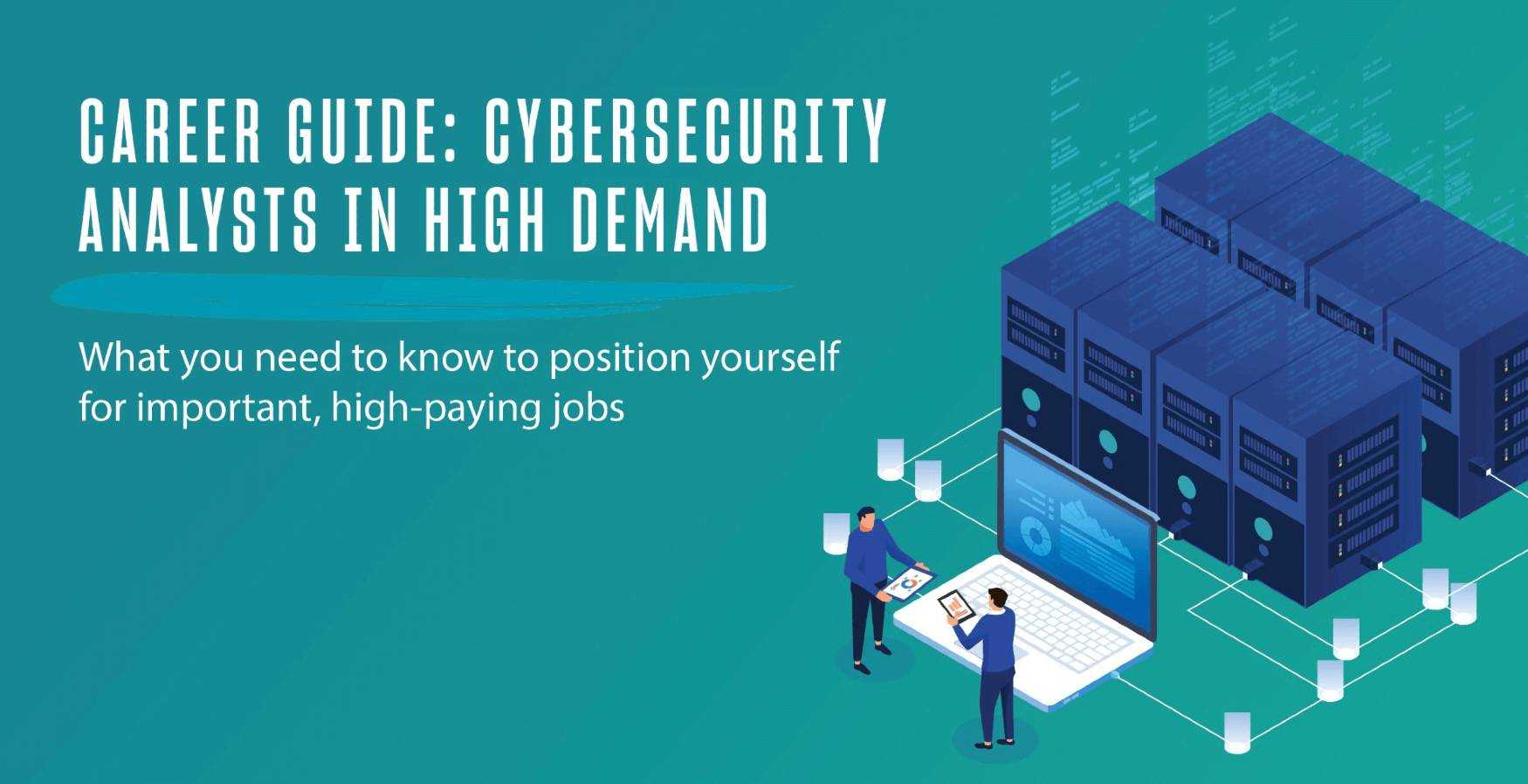What you need to know to position yourself for important, high-paying jobs
In the digital age, cybersecurity professionals play a pivotal role in safeguarding our most sensitive data. From defending against cyberattacks to securing networks, the demand for skilled professionals in this field is more critical than ever. If you’re interested in a career that combines problem-solving, technology and the opportunity to protect millions of people, becoming a cybersecurity analyst might just be your calling.
This guide will show you what it takes to start a career in cybersecurity, highlighting the steps you need to take to become an analyst in the high-demand field.
What Is a Cybersecurity Analyst?
As a cybersecurity analyst, you will plan and implement security measures to protect the computer networks and systems of a company or organization.
You may also help create a disaster recovery plan, which an IT department will follow in the event of a breach of security emergency.
One of the biggest aspects of your job is keeping up to date on IT security and the latest methods that attackers are using to potentially infiltrate a system. It’s important to constantly research the latest technology in order to determine the most effective methods of protection against cyberattacks.
Why Cybersecurity Analysts Matter
From individuals to large corporations, no one is safe from a cyberattack. Target, Yahoo, eBay, UPS, Google and Apple are among the countless large U.S. companies that have experienced security breaches, exposing customer-sensitive data. As a cybersecurity analyst, you are on the front lines in the battle against hackers who are targeting companies and government organizations.
Cyber Defense Magazine reports that small businesses are the target of 43% of cyberattacks. Global cyber education firm Cybint reports that there is a hacker attack every 39 seconds with more than 93% of health care organizations having been the victim of a data breach within the last three years.
Cybersecurity Analyst Job Duties

Cybersecurity roles, including analysts, engineers and information security analysts, each have unique responsibilities. If you’re asking yourself, “What do cybersecurity analysts do?” review this breakdown of job duties and how the role differs from related positions.
Cybersecurity analysts are key players in an organization’s cybersecurity team. They:
- Monitor networks to spot security breaches or irregularities.
- Investigate security breaches to understand what happened and fix vulnerabilities.
- Stay updated on IT security trends and threats.
- Develop and enforce security policies to protect sensitive information.
- Install security measures like firewalls to guard against cyber threats.
- Educate staff on security awareness and best practices.
- Conduct tests to find system vulnerabilities that need fixing.
Cybersecurity engineers focus on building and maintaining systems to prevent cyber threats. Their work includes designing security systems and implementing technical solutions to secure an organization.
Information security analysts aim to protect all sensitive information within an organization. They work across various platforms to secure data and maintain privacy.
A typical job description for a cybersecurity analyst might list duties such as creating security strategies, managing incident responses and collaborating with IT departments to keep digital assets safe from cyber threats.
Important Skills for Cybersecurity Analysts
Becoming a successful cybersecurity analyst requires a mix of technical (hard) skills and personal (soft) skills. Here’s a breakdown to help you understand what you’ll need to thrive in this role.
Technical Skills
These are the specific, teachable abilities that you can gain through education and experience:
- Information security: Understanding principles and methods to ensure the integrity, confidentiality and availability of information.
- Information systems: Having knowledge of, and the ability to work with, complex data systems and networks.
- Linux: Proficiency in Linux operating systems, which are widely used in cybersecurity.
- Network security: The ability to protect network infrastructure and the data flowing through it.
- Threat analysis: Identifying and assessing potential threats to digital assets.
- Security operations: Understanding the procedures and operations involved in ensuring an organization’s security.
- Vulnerability assessment: Identifying, quantifying and prioritizing system vulnerabilities.
- Project management: Skills needed to manage projects, including planning, executing and closing cybersecurity projects.
- Intrusion detection: Monitoring networks and systems for breaches or malicious activities.
Soft Skills
These are less about technical knowledge and more about how you work and interact with others:
- Analytical skills: The ability to analyze data, systems and networks to identify and assess risks and understand how to improve security measures.
- Detail-oriented: Paying close attention to the intricate details of systems and networks to detect any potential security threats.
- Proactivity: Being one step ahead by anticipating risks and implementing protective measures to secure computer systems and information.
- Problem-solving skills: Quickly responding to and solving issues as they arise, whether they’re alerts, breaches or security flaws.
Combining these hard and soft skills will prepare you for technical aspects of the job and equip you with the mindset and approach needed to excel as a cybersecurity analyst.
Cybersecurity Analyst Salary and Job Outlook

The ongoing rise of cyber-attacks underscores the growing need for skilled cybersecurity analysts. These professionals are at the forefront of developing and implementing strategies to mitigate and prevent digital threats.
Projected Job Growth
The Bureau of Labor Statistics (BLS) forecasts an impressive 32% increase in employment for information security analysts from 2022 to 2032, a rate much faster than the average for all jobs, which is 3%. This surge is in response to the escalating reliance on technology by individuals and companies and highlights the vital role of cybersecurity analysts in today’s tech-centric business environment. There are currently more job openings in cybersecurity than there are qualified candidates to fill them. Therefore, developing skills in this area can make you a highly sought-after professional.
Salary Insights
Cybersecurity analysts can expect to earn an average annual salary of $112,000, although wages can vary based on experience, location and industry needs. Top performers who innovate in cybersecurity measures can see even higher earnings.
Escalating cyber threats and the crucial need for protection in a digital world offer cybersecurity analysts not just a job but a career with a very promising future.
What You Need for a Cybersecurity Analyst Position
Cybersecurity analysts are crucial in every sector, from government and healthcare to retail and financial services. To prepare for any of those roles, candidates need a mix of education, experience and certifications.
Educational Requirements
Most entry-level cybersecurity analyst positions require at least a bachelor’s degree in fields such as computer science, information assurance, programming or a related discipline. This foundational education equips you with the basic principles and knowledge needed for a career in cybersecurity.
Pursuing advanced education, such as a Master’s in Cyber Security Engineering or Master’s in Cyber Security Operations and Leadership, can significantly deepen your knowledge and expertise. These advanced degrees help expand your understanding of cybersecurity challenges and solutions and make you a more competitive job applicant.
Experience Requirements
In addition to educational qualifications, practical experience plays a critical role. Many employers look for candidates with experience in related positions within information technology departments. This experience helps you understand the real-world applications of your cybersecurity knowledge and skills.
Certification Requirements
Earning certifications can significantly enhance your value as a job candidate. These credentials demonstrate expertise and a commitment to your career. Popular certifications for cybersecurity analysts include:
- CompTIA Network+: Validates the essential knowledge and skills needed to design and implement functional networks.
- CompTIA Security+: Provides a baseline of cybersecurity skills and is often the first security certification IT professionals pursue.
- CompTIA Cybersecurity Analyst (CySA+): Focuses on behavioral analytics to improve the overall state of IT security.
- CompTIA Advanced Security Practitioner (CASP+): Targets professionals who design and implement security solutions.
- Security Analytics Expert certification: Recognizes advanced skills in analyzing and interpreting data to protect organizations from threats.
- EC-Council Certified Ethical Hacker (CEH): Teaches how to think and act like a hacker (a legal one, of course), which is a valuable perspective for securing networks.
- Certified Security Analyst Training: Prepares analysts to conduct vulnerability assessments and penetration testing.
- GIAC Information Security Fundamentals (GISF): Covers the basics of information security for IT professionals.
- GIAC Security Essentials Certification (GSEC): Validates a practitioner’s knowledge of information security beyond simple terminology and concepts.
- Certified Information Systems Security Professional (CISSP): Recognized globally as a standard of achievement that confirms an individual’s knowledge in the field of information security.
By combining the right education, practical experience and targeted certifications, you can position yourself as a strong candidate for a cybersecurity analyst role and contribute significantly to the security posture of any organization.
7 Steps to Become a Cybersecurity Analyst
Starting a career as a cybersecurity analyst means entering a fast-paced world where you protect data and systems from cyber threats. Here’s a step-by-step guide to navigating the necessary milestones to secure your place on this career path.
Step 1: Get Educated
Begin with foundational knowledge in cybersecurity. Enroll in introductory courses or consider a comprehensive curriculum that offers a broad overview. Programs that introduce you to cybersecurity tools, threats and defenses lay the groundwork for your career.
Step 2: Build Essential Skills
Focus on refining both technical skills, such as intrusion detection, data security and networking, alongside workplace skills, including critical thinking, communication and stress management. This blend prepares you for the multifaceted challenges in cybersecurity roles.
Step 3: Obtain Certifications
Certifications are crucial for proving your expertise. Start with foundational programs such as CompTIA Security+, and then progress to advanced certifications. These experiences not only bolster your resume but also keep you current on best practices and emerging threats.
Step 4: Gain Practical Experience
Seek internships or entry-level positions in IT or related fields. You’ll gain invaluable insights into how cybersecurity practices are applied in the business world and enhance your understanding of system vulnerabilities and protection strategies.
Step 5: Network in the Field
Active networking keeps you informed of the latest cybersecurity trends and opens up new opportunities. Engage with the community through conferences, seminars and online forums. Connecting with peers and experts can provide guidance and insights vital for career growth.
Step 6: Advance Your Education
Anyone aiming for high-level positions should consider advanced degrees, like a Master’s in Cyber Security Engineering or Leadership. Such programs deepen your knowledge, provide specialized skills and make you a standout candidate in the job market.
Step 7: Apply Strategically
Empowered with education, skills, certifications and experience, you’re now ready to target cybersecurity analyst positions. Customize your applications to reflect how your unique background aligns with the specific needs of each employer. Highlight your continuous learning mindset and readiness to tackle contemporary cybersecurity challenges.
Companies Hiring for Cybersecurity Analysts
A recent search for “cybersecurity analyst” job openings on LinkedIn revealed more than 4,500 results at a wide variety of companies, some of which are cited below. (You can see similar LinkedIn search results here.)
- American Express
- Volvo Group
- Brennan Center for Justice
- Lowe’s Companies
- The Hollister Group
- BlueCross BlueShield
- TikTok
- Booz Allen Hamilton
- PayPal
- MIT Lincoln Laboratory
- FEMA
- Warner Bros. Discovery
- Hilton
- Coca-Cola Consolidated
- Chevron
- Coinbase
- Oklahoma City Thunder
As you can see, the opportunities for cybersecurity analyst positions span a wide variety of industries, including financial services, health care, entertainment, sports, consumer products, travel, government and more.
According to Cyberseek’s Cybersecurity Supply/Demand Heat Map, the states with the most cybersecurity job postings include New York, Maryland, Virginia, Illinois, Florida, Georgia, Texas and California.
Cybersecurity Analyst Career Path
Becoming a cybersecurity analyst doesn’t involve a single path but unfolds through a series of educational and professional decisions tailored to individual goals and circumstances.
Bachelor’s Degree: The Starting Point
Most aspiring cybersecurity analysts begin with a bachelor’s degree in computer science, programming or a related field. This foundational step equips you with essential knowledge required for entry-level positions in cybersecurity.
Gaining Experience Via Diverse Pathways
After earning a bachelor’s degree, the next steps are less linear. Some professionals dive straight into the workforce to gain hands-on experience, while others may pursue internships or certifications to bolster their skills. This phase is crucial for applying theoretical knowledge to real-world cybersecurity challenges and understanding where your interests lie within the vast field of cybersecurity.
Elevating Your Career with a Master’s Degree
Deciding when to pursue a master’s degree in cybersecurity depends on several factors, including your career goals, the specific demands of your desired job market and the skills required for the roles you aspire to. A master’s degree is particularly beneficial for those looking to:
- Specialize in a specific area of cybersecurity.
- Assume leadership roles that require advanced knowledge and strategic thinking.
- Stay up-to-date on the latest technologies, threats and mitigation strategies.
Professionals often consider a master’s degree after gaining some work experience, which enables them to better grasp the advanced concepts taught in these programs and apply them more effectively in their jobs.
Embracing Continuous Learning
Regardless of the path chosen, continuous learning remains a key aspect of a cybersecurity career. The field is fast-evolving, with new threats and technologies emerging regularly. Staying informed through additional certifications, workshops and industry networking is vital for career advancement.
The University of San Diego offers resources like the Cybersecurity Blog and advanced degree programs, such as the Master of Science in Cyber Security Operations and Leadership, to support ongoing education. These programs, designed with input from cybersecurity professionals, ensure relevance and applicability in the field, preparing graduates for the challenges ahead.
Choosing when and how to advance within cybersecurity is a personal decision influenced by individual career aspirations, life circumstances and the ever-changing landscape of technology. Whether stepping straight into advanced education or weaving through industry complexities first, each path offers unique insights and opportunities to grow as a cybersecurity professional.
Frequently Asked Questions
Other Cybersecurity Careers You Might Be Interested In
Cybersecurity is a fast-growing, high-paying field with a range of different types of job openings. Which role might be ideal for you? Take a moment to explore some of the other exciting careers in cybersecurity:
Chief Information Security Officer (CISO)
Lead Software Security Engineer
Cybersecurity Manager/Administrator
Cyber Threat Intelligence Analyst
Article Sources and Citations
Bureau of Labor Statistics. https://www.bls.gov/ooh/computer-and-information-technology/information-security-analysts.htm
Bureau of Labor Statistics. https://www.bls.gov/ooh/computer-and-information-technology/information-security-analysts.htm#tab-2
Cyber Seek. https://www.cyberseek.org/heatmap.html
Cyber Seek. https://www.cyberseek.org/pathway.html
FBI. https://www.fbi.gov/investigate/cyber
Indeed Editorial Team, “10 Cybersecurity Analyst Certifications You Can Pursue.” https://www.indeed.com/career-advice/career-development/cyber-security-analyst-certification
LinkedIn search. https://www.linkedin.com/jobs/search/?currentJobId=3861702445&keywords=cybersecurity%20analyst
Mehdi Punjwani, “Cybersecurity statistics in 2024.” https://www.usatoday.com/money/blueprint/business/vpn/cybersecurity-statistics/
ThriveDx. https://thrivedx.com/resources/article/cyber-security-facts-statistics?referrer=cybint
University of San Diego, “Browse cyber security articles.” https://onlinedegrees.sandiego.edu/blog/cyber-security/





